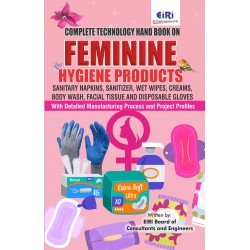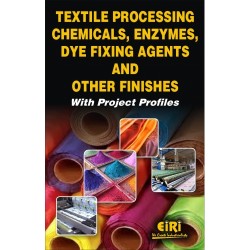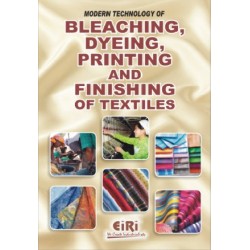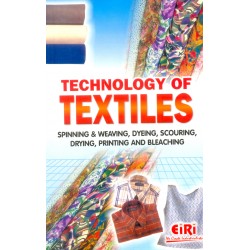Complete Technology Book of COIR PRODUCTS AND JUTE GEO-TEXTILES WITH COIR PITH, COIR CORRUGATED ROOFING SHEET, COIR MATTRESSES, RUBBERISED COIR, COIR GEOTEXTILES,COIR FIBRES, COIR FIBRE BOARDS AND ALLIED PRODUCTS MANUFACTURING

- More than 45 years of experience
- Managed by expert industrial consultants
- ISO 9001-2015 Certified
- Registered under MSME, UAM No: DL01E0012000
- 24/5 Research Support
Get your quesries resolved from an industry expert. Ask your queries before report or book purchase. - Custom Research Service
Speak to the our consultant to design an exclusive study to serve your research needs. - Quality Assurance
All reports are prepared by highly qualified consultants & verified by a panel of experts. - Information Security
Your personal & confidential information is safe & secure.
The book covers: Composition of Coir Pith, Coir Corrugated Roofing Sheet manufacturing Unit, Coir fibre reinforced green polymeric composites for injection Moulding Products, Using Coir Pith for Absorption and Recovery of Oil, Benefits of Pyrolysis Oil production from coir pith, Self Curing Concrete Using Coir Pith as Fine Aggregate, Coir Mattresses, Rubberised Coir Classification, Rubberised coir fibre liners for manufacture of coir garden articles, Coir Fibers as Pulp and Paper, Coir Mulch Needle Punched Non-Woven Fabric for Agro-Application, Use Of Coir Geotextiles In Unpaved Roads, Coir Geotextile - A Sustainable Reinforcing Material For Pavement Construction, Coir Fibre and its Application as Erosion Control Mats, Effectiveness of coir geotextiles in soil moisture conservation, Medium Density Coir Fiber Boards, Composite Applications using Coir Fibres, Jute Geo-textiles, Manufacturing process of Jute Geotextiles (JGT), The Full Scale Experimental Wall, Asphalt-Geotextile barriers for waste containment, Oil Retaining and Treating Geotextile for Pavement Applications, Application of Geotextiles in Pavement Drainage Systems, Equipments available in india for testing jute Geotextiles, Plant Economics of Gunny Bag Manufacturing Plant, Plant Economics Of Jute Garments, Plant Economics Of Jute Yarn, Jute Sutli & Hessian Cloth Weaving Integrated Unit,
CONTENTS
1. Composition of Coir Pith
Structure of coir pith
Properties of Coir Pith
Export Potential of Coir Pith
Environmental Impact due to Coir Pith Hillocks
Agri / Horti Uses
Growing Media
As Amendment
Coir Pith Blocks and Discs
As a substitute to Peat Moss
As an Organic Fertilizer
Biological Treatments for Enhancing
Coir Pith (Conventional process)
Method of composting
Modification of existing composting process
Provision of perforated PVC pipes
Properties of C-POM
Significance of Organic Manure
Requirement of Coir Pith Organic Manure (C-POM)
Composting of Coir Pith
Substituting Urea with Natural Supplements
Azolla -Soya hulls combination
Azolla pinnata
Soya hulls
Azolla -Fish waste combination (2:1)
Cyano bacteria
As a Base for Home / Vertical / Roof Garden
Laying Methodology for Roof Lawns
Potting Media
As Soil Substitute
Coir baskets
Industrial Applications
For Active Carbon for SiC (Silicon Carbide)
Carbonization Process
As a Source of Power Alcohol
Production of Cellulase
Extraction of Sodium Lignosulphonate
Extraction of Sodium Lignosulphonate
Uses of Sodium Lignosulphonate
Nanocellulose from Coir Pith
Production of Bio ethanol
Conversion of coir pith to nanocellulose
Production of Bio Oil
Preparation of Particle Board
As an Insulator
Production of Vanillin
Production Activated Carbon
Steam Activation
Chemical Activation
Coir Pith Polyester Composites
Coir reinforcement
Mould releasing agent.
Moulds
Method
Binder less Coir Wood
Drying of the materials
Sieving
Hot pressing
Effect of Moisture
Effect of Temperature
Effect of pressure and cooling under pressure
Machining
As a Carrier Material
Extraction of natural dyes out of coir pith
Expansion Joint Filler
Value addition of Tender Coconut Husks
Production of Pulp and Paper
Important features of the paper making
machine for coir
2. Coir Corrugated Roofing Sheet manufacturing unit
Introduction
Materials and Methods for the Manufacture of
Coir Corrugated Sheets
Coconut coir non-woven felt
Woven bamboo mat
Resin
Raw materials for resin manufacture
Test Methods To Assess The Quality of Cardanol
Resin kettle or Batch resin reactor
Consolidation of non-woven coir felt
Machinery/ equipment:
Salient feature in manufacture of coir felt corrugated
sheet
Moisture content of coir felt and mats:
PCF Resin Adhesive Formulation [for bonding]
Requirement of PCF resin
Glue Application on the Coir Felt and Bamboo Mat
Stabilization and Drying of Resin Coated Mats
Assembly of Coir Felts/Mats
Hot pressing 77
DIMENSIONING AND FINISHING
Machinery and Equipment
3. Coir fibre reinforced green polymeric composites
for injection Moulding Products
Introduction & Scope
Literature Survey
Coir Fibre
Advantages of coir Fiber
Coir Fibre Modification
Alkali Treatment
Silane Treatment
Acetylation
Benzoylation
Composites
Biocomposites
Coir Fibre based biocomposites
Poly propylene
MAPP used as compactabilizer
Materials
Method
Modification of coir fibre
Preparation of PP-Coir Composite
Testing & Characterization
Density
Water Absorption
Heat deflection temperature (HDT)
Hardness
Tensile Testing
Flexural Properties
Impact Test
4. Using Coir Pith for Absorption and Recovery of Oil
Introduction 101
Manufacturing Process
Methodology
Performance result of the screw press
5. Benefits of Pyrolysis Oil production from
coir pith
Coir pith : A potential industrial residue for high
value addition
Effective & enhanced oil absorption in Coir Pith:
6. Self Curing Concrete Using Coir Pith as
Fine Aggregate
Introduction
Need for self-curing
Purpose of internal curing
Effects of improper curing
Advantages of internal curing
Constiuent Materials
Physio-chemical properties of Coir pith
Chemical Composition of coir pith 113
Properties of cement, Fine Aggregate and
Coarse Aggregate
Mix Proportion
Experimental Investigation
Preparation of Coir pith
Batching of Materials
Mixing of materials
Casting
Internal Curing
Period of curing for conventional cubes
Result And Discussion
Weight density test
Compressive strength test (IS 516 1959)
Flexural strength test (IS 516 1959)
Impact Test (IS 516 1959)
Cost Analysis
Conclusion
7. COIR MATTRESSES
Introduction
Product & Its Application
Desired Qualifications For Promoter:
Market Potential And Marketing Issues, If Any
Raw Material Requirements
Rubberized coir formulation process of manufacture
List Of Machinery
Coir Sheet Machine (Sheeting Line)
Coir Rope Untwisting Machine
Hydraulic Press
Band Saw Cutting Machines
Ball Mill
Vulcanizing Chamber
Tank
8. Rubberised coir Classification
Rubberised Coir Industry
Natural Rubber Latex – Its Source,
Composition and Properties
Composition ot'NR latex
Main function of (he latex
Raw Materials for rubberized coir mattress
Natural Rubber Latex Concentrates
Centrifuged Latex
Evaporated Latex
Creamed Latex
Preservatives
Curled Coir Rope
Manufacturing Process of Rubberised Coir
Choice of fibre for Rubberised coir
mattresses/cushions
Curling
Pre arrangement of fibres
Spraying
Drying
Quality of rubberised coir mattress
Characteristics of Rubberised Coir cushion
Applications of Rubberised
Quality parameters for Rubberised Coir Mattress
Latex foam backed coir matting
Spreading Process
Advantages
9. Rubberised coir fibre liners lor manufacture of
coir garden articles
Advantages of pots manufactured from rubberised
coir fibre liners
Coco Pols
Coco poles or Plant climbers
Coir Fiber Liners
Coir Fiber Disks
Hemi spheres from Coir fibre Mners
Decorative articles from coir
Rubber backed coir mats/ Matting Tiles
Advantages of Rubber Backed Coir Mats/ Matting
Tiles
Fire retardant finishes to Rubberised Coir
10 Coir Fibers as Pulp and Paper
Introduction
Materials and methods 3
Material
Morphology
Chemical pulping
Preparation of laboratory paper making
and characterization
Statistical analysis
Results and discussion
Morphological characteristics
11. Coir Mulch Needle Punched Non-Woven
Fabric for Agro-Application
Introduction
Methodology 9
Materials and Methods
Selection of Raw Material
Fabric Formation
Non-Woven
Needle Punching Technique
Machine Detail
Specification
Fabrication
Finishing's
Treatment of Natural Glue with Coir Mulch Sample
Ingredients
Process
Analysis
Environmental Conditions
Measurements
Plant growth parameters
Testing's
Result and Discussion
Visual Analysis
Comparative Study of Soil Temperature and
Weed Control Measures
Competition of Synthetic Mulch with Coir
Mulch in the Growth of Fenugreek Plants for
Water Conservation 156
Comparative Growth Rate of Fenugreek Plant
A field survey on awareness, utility and
usage of mulching
Air and water permissibility of coir mulch
Level of satisfaction on coir mulch
12. Use Of Coir Geotextiles In Unpaved Roads
Introduction
Subgrade Separation And Stabilization
Typical Solutions
Geotextile Solution
Geotextile Benefits
Bask Reinforcement
Typical Solutions
Geotextile Solution
Drainagl / Filtration
Coir As A Suitable: Geotextile Material For Roads
As Reinforcement
As separator
As filler/drainage layer
Strength of suhgrade
Field Installation of Geotextile
13. Coir Geotextile - A Sustainable Reinforcing
Material For Pavement Construction
Introduction
Coir Geotextiles For Strengthening Soft Soil
Subgrade
Present Status
Geotext1le In Unpaved Roads
Separation
Lateral Restraint
Tensioned Membrane Effect
Application of Geotextile Separation
Filtration
Reinforcement
Scaling Function
Laying of Coir Geotextiles
14. Coir Fibre and its Application as Erosion Control
Mats
Introduction
Mechanism of erosion control
Characteristics And Standard Specification
of Coir Based Erosion Control Mats
Characteristics of coir fibre
Chemical campoaitian of coir and other natural
fibres
Specifications
15. Effectiveness of coir geotextiles in soil
moisture conservation
Introduction
Materials and Methods
Results and Discussions
Crop: Bhindi
Effect of mulch on growth parameters
Effect of mulch on height of plants
Effect of mulch on Number of leaves
Effect of mulch on lateral spread of the plant
Effect of mulching on yield parameters
Effect of mulch on weed intensity
Effect of mulch on yield parameters
Length of fruits as influenced by mulch (cm)
Effect of mulch on weed intensity
Effect of mulch on soil temperature
Effect of mulch on soil moisture
16. Medium Density Coir Fiber Boards
Introduction
Materials And Methods
Preparation of Medium-Density Coir Boards
Chemical Treatment
LOI Test
Determination of Fire Resistance 1
Results and Discussion
17. Composite Applications using Coir Fibres
Introduction
Study on products and materials
Investigation of current status of coir
composite research
Fibre cleaning procedures
Fibre chemical treatments
Chemical modification
Graft polymerisation with MMA:
Acetylation
Other findings in literature
Acrylic resins as binder:
Natural fibre composite based on processing
technology
Natural fibre composite in application:
Conclusions of literature research
Investigation of material and technological
properties of coir for composite manufacturing
Research on micro-scale has been carried out at
Appropriate combinations of products
and technologies
Identifying potential marketability of coir
composite products
Raw materials
Coir Fibre
Polymer
Technology and products
Market for coir based composites
Technology development
Raw materials
Manufacturing of composite specimen
Vacuum Injection Technology
Latex and Monomer Impregnation
Prepregging with MMA monomer
LFT processing
Materials used
Procedure of the trials
Effect of treatments on the properties of
composite specimen
Prototyping
Vacuum Injection
Compression Forming with thermoplastic prepregs
LFT 18. Jute Geo-textiles
18. Jute Geo-textiles
Composition and Characteristics of Jute Fibre
Tenacity
Elongation
Flexural Rigidity and Torsional Rigidity
Hygroscopicity
Thermal behaviour
Structure of Jute
Properties of Jute Fabric
19. Manufacturing process of Jute Geotextiles (JGT)
Separation
Filtration
Drainage
Initial Reinforcement
Control of Surface Soil detachment
Bio-technical Support
Transportation, Storage & Handling of JGT
Storage
Site unloading
Site Handling
Installation
Properties of JGT and Important Test Methods
Physical Properties
Physical Properties
Mass per unit area
Thickness
Porometry (AOS
By Microscope
By Reverse Dry Sieving Technique
By Wet Sieving
Drapability
Mechanical Properties
Tensile Strength
Puncture Strength
Burst Strength
Tear Strength
Frictional Resistance
Hydraulic Properties
Soil Permeability (ks)
Permittivity of JGT
Transmissivity
Determination of clogging potential of JGT
Durability of JGT
Bitumen as water-repellent
Utilization of Palm-mat Geotextiles to
Conserve Agricultural Soils
Objectives
Analyses of Selected Mat Properties
Computation of Effectiveness of Geotextile-covered
Plots
Statistical Analysis
Results
Selected Physical Properties of the Mats
Splash Erosion
Runoff Volume
Sediment Yield
Geotextile Reinforced Walls
20. The Full Scale Experimental Wall
21. Asphalt-Geotextile barriers for waste
containment
Hydraulic conductivity of FAA-GT
Vapor transmission rates for FAA-GT
22. Oil Retaining and Treating Geotextile for
Pavement Applications
Development of the Geotextile
Initial Biofilm Experiments
Hydrocarbon Retention Experiments
Retention Experiment 1
Retention Experiment 2
pavement sections
23. Application of Geotextiles in Pavement
Drainage Systems
Physical properties
Mechanical properties
Hydraulic properties
Endurance properti
Types of Geotextiles
Woven fabrics
Non-woven
Knitted fabrics
Function of Geotextile in Drainage
Advantages of using Geo-textile in Drainage
Conclusion
JGT Manufacturing Process Photographs
24. Equipmnets available in india for testing jute
Geotextiles
25. Plant Economics of Gunny Bag Manufacturing
Plant
Plant & Machinery
Fixed Capital
Raw Materials
Total Working Capital/Month
Total Capital Investment
Turn Over/Annum
26. Plant Economics Of Jute Garments
Plant & Machinery
Fixed Capital
Raw Materials
Total Working Capital/Month
Turn Over/Annum
27. Plant Economics Of Jute Yarn, Jute Sutli & Hessian
Cloth Weaving Integrated Unit
Plant & Machinery For Jute Yarn:
For jute sutli
For Hessian Cloth
Fixed Capital
Raw Materials For Jute Yarn
For Jute Sutli
For Hessian Cloth
Total Working Capital/Month
Turn Over/Annum
LIST OF TABLES
Table 2.1: Coir corrugated sheet - 3 ply
Table 2.2: Coir felt corrugated sheet - 5 ply
Table 2.3: Other Test performed on coir felt corrugated sheets
Table 3.1: Chemical Composition of coir fibre
Table 3.2: Physical Properties of Coir Fiber
Table 3.3 Formulations for compounding
Table 4.1. Results of proximate analysis
Table 6.1: Chemical composition of coir pith
Table 6.2 Properties of cement, Fine Aggregate and Coarse Aggregate
Table 10.1. Soda-AQ pulping condition for coir fibers.
Table 10.2. Full factorial DOE coir pulping settings.
Table 10.3. Fiber characteristics of coir fiber.
Table.11.1: Comparative study of mulch sheets
towards moisture retain and weed control
Table 14.1: Chemical composition of coir fibre
Table 14.2: Properties of various fibres
Table 14.4; Typical specifications of Natural Geotextile
(MARV*) using Coir (MoRTH 700)
Table 15.1 Height of plants Vs different treatments for Bhindi crop
Table 15.2 Number of leaves Vs different treatments for Bhindi crop 1 (xxiv)
Table 15.3 Lateral spread Vs different treatments for Bhindi crop
Table 15.4 Effect of mulching in different treatments for Bhindi crop
Table 15.5 Weed Intensity Vs different treatments for Bhindi crop
Table 15.6 Variation in fruit parameters with different treatments for Pineapple crop 193
Table. 15.7 Weed Intensity Vs different treatments for pineapple crop
Table. 15.8 Soil temperature Vs different treatments
Table 15.9 Soil temperature Vs different treatments
Table 16.1. Consolidated results of flammability,
flame penetration, and rate of burning tests.
Table 18.1: Composition of Jute Fibre.
Table 18.2: Comparative physical properties of Jute
and Other Fibres. 235
Table 18.3: Properties of some typical Jute Geotextiles
Table 18.4: Open mesh woven jute geotextiles
(IS Specifications) 238
Table 18.5: Woven Jute Geotextiles
Table 18.6: Nonwoven Jute Geotextiles
(Indicative Specifications)
Table 18.7: Properties of Pre-Fabricated Jute Drain
with Coir Wicks 239 (xxv)
LIST OF FIGURES
Fig. 1.1 Scanning Electron Microscope of raw coir pith
Fig. 1.2 Leachate from accumulated coir pith washing.
Fig. 1.3 Grow bags filled with coir pith for plant cultivaton
Fig. 1.4 Utilization of coir pith as amendment in crop cultivation
Fig. 1.5 (a) Pleurotus sajor caju - Culture on PDA
1.5 (b) Fruiting body in natural condition
1.5 (c) PITHPLUS
Fig. 1.6 Schematic diagram of aerator tube assembly
Fig. 1.7 Demonstration of PVC aerator tube assembly
Fig. 1.8 Pilot demonstration on coir pith hillock
composting (250 tons)
Fig. 1.9 SEM view of C-POM
Dosage (per annum) for application of
C-POM on different crops
Fig. 1.10 Structural concepts of vertical garden
Fig. 1.11 Demonstration of Vertical Garden
Fig. 1.12 Bridge in France with Vertical Garden
Fig. 1.13 Roof gadening
Fig. 1.14 SEM view of C-POM
Fig. 1.15 Conversion of coir pith to nanocellulose
Fig. 1.16 Coir Polyester Moulded Products
Fig. 2.1: Coir Corrugated Sheets - Process Flow Chart
Figure. 3.1 Coir Fibre
Figure. 3.2 Extraction of Coir Fibre
Figure 3.3 Commercial applications of coir fiber 87
Figure 3.4 Influence of alkali treatment on cellulose
structure 89
Figure 3.5 Polypropylene 93
Figure 3.6 Reaction mechanism of Cellulose with MAPP
Figure 3.7 Specimen of testing Sample
Fig 4.1. Block diagram showing the process and
components
Fig. 4.2. Hydraulic press used during experiment
Fig. 4.3 Oil recovery from the coir pith
Fig. 4.4. Drawing of the screw press 5
Fig. 4.5 (a). View of the screw press
Fig. 4.5 (b). View of the screw press
Fig. 4.6. Oil extracted from the coir pith using
the screw press
Fig. 4.7. Oil absorbed in to coir pith
Fig. 4.8. Coir pith to oil absorption 107
Fig. 5.1 A view of the Pyrolysis oil produced from Saw
dust using a proto type reactor 109
Fig. 5.2: View of a pyrolyser rector (proto type) used
for conversion of biomass in to liquid fuel
Fig. 5.3 The process of oil recovery using coir pith
Fig 6.1 Preparation of coir pith
Fig 6.2 Mixing with water
Fig 6.3 Mixing coir pith with cement
Fig 6.4 Removal of water by squeezing
Fig 6.5 Mixing with concrete specimen the coir
pith concrete
Fig 6.6 Moulding of concrete
Fig 6.7 Moulding of concrete specimen
Fig 6.8 Moulding of cube prism. For impact test concrete (xxvii)
Fig 6.9 Schematic diagram of Internal Curing
Fig 6.10 Curing of concrete specimens
Fig.11.1: Natural Gum
Fig.11.2: Dissolved Glue with Coir Sample
Figure 11.1 Shows the solid form of neem and babul
gum and Figure 11.2 shows the glues in semisolid form.
Fig: 11.3 Application of Coir Mulch on Soil Surface 153
Fig. 12.1 Geotextile as Separator
Fig. 12.2 Reinforcement Action
Fig. 12.3 Drainage Application
Fig. 12.4 Variation of Peak Shear stress vs. Normal Stress
for red soil - Coir Geotextile Interface
Fig 12.5. Load Settlement behaviour with Coir geotextiles
placed at z/B = 0.5
Fig. 12.6. Effect of Type of Reinforcement on load
penetration
Fig. 13.1 Geotextile as a separator
Fig. 13.2 Filtration and Transmissivity Functions
Drainage (Transmissivity)
Fig. 13.3 Scaling Functions
Figure 14.1 (a) Protection of road embankment
Figure 14.2: (a) Mean Stress-Strain Curve for coconut fibre (b)
Stress-Strain Curves of Natural Fibres
Figure 16.1. Arrangement for flammability test.
Figure 16.2. Arrangement for flame penetration test.
Figure 16.3. Arrangement for rate of burning test.
Figure 18.1: Photographs of Jute Plant, Jute
Figure 18.2: Jute geotextiles for control of surface soil
erosion
Figure 18.3: Jute geotextiles for filtration and drainage
Figure 18.4: Jute geotextiles for separation and filtration
Figure 18.5: Prefabricated jute drains for accelerated
consolidation of soft soil 234
Figure 19.1. Schematic plan of the runoff plots at Hilton
Figure 20.1. Cross-section of experimental full size wall.
Figure 20.2. Saturation of an experimental full
size wall.
Figure 21.1. Examples of asphalt concrete and fluid
applied asphaltgeotextile barrier applications.
Figure 21.2 Sampling the field FAA-GT from the test pad
Figure 21.3 Set up for vapor transmission tests.
Figure 21.4. Solvent vapor transmission tests showing
FAA-GT and HDPE geomembranes exposed to
xylene.
Figure 22.1 Typical Results of Distribution of
Throughout Osmocote Plus Treated PPS 283
Figure 22.2 Re-interpretation of Bond's
Long Term Experiment
Figure 22.3 Initial Dynamic Retention Trial
Figure 22.4 Cross section of larger textile-only rig
Figure 22.5 Schematic Experimental Systems
Using Heat Bonded Polyolefin Geotextile
Figure 22.6 Experimental systems for the new
geotextile (NPMPE) and Non-Geotextile (N-G)
Figure 23.1: Geo-textile used for drainage.
Figure 23.2: Geo-textile layer in sub-grade.
Figure 23.3: Use of fabrics in drainage.
COMPOSITION OF COIR PITH
Coir waste has a high lignin (30-31%) and cellulose (26.8%)
content. Its carbon nitrogen ratio is around 112:1. Lignin is a complex
amorphous polymer of phenyl propane which surrounds the
cellulose in cell walls and is relatively inert to hydrolysis. Because
of the high lignin content left to it, coir waste takes decades to
decompose.
Coir pith has a calorific value of 3975 kcal per kg close to 4200
kcal per kg of coal and hence it can be used as fuel briquette and
also in pig iron manufacture, tobacco fluecuring, gas absorbent
cotton etc.
1.1 STRUCTURE OF COIR PITH
Lignin and cellulose work together to provide a structural function
in plants
How to Make Project Report?
Detailed Project Report (DPR) includes Present Market Position and Expected Future Demand, Technology, Manufacturing Process, Investment Opportunity, Plant Economics and Project Financials. comprehensive analysis from industry covering detailed reporting and evaluates the position of the industry by providing insights to the SWOT analysis of the industry.
Each report include Plant Capacity, requirement of Land & Building, Plant & Machinery, Flow Sheet Diagram, Raw Materials detail with suppliers list, Total Capital Investment along with detailed calculation on Rate of Return, Break-Even Analysis and Profitability Analysis. The report also provides a birds eye view of the global industry with details on projected market size and then progresses to evaluate the industry in detail.
We can prepare detailed project report on any industry as per your requirement.
We can also modify the project capacity and project cost as per your requirement. If you are planning to start a business, contact us today.
Detailed Project Report (DPR) gives you access to decisive data such as:
- Market growth drivers
- Factors limiting market growth
- Current market trends
- Market structure
- Key highlights
Overview of key market forces propelling and restraining market growth:
- Up-to-date analyses of market trends and technological improvements
- Pin-point analyses of market competition dynamics to offer you a competitive edge major competitors
- An array of graphics, BEP analysis of major industry segments
- Detailed analyses of industry trends
- A well-defined technological growth with an impact-analysis
- A clear understanding of the competitive landscape and key product segments
Need Customized Project Report?
- Ask for FREE project related details with our consultant/industry expert.
- Share your specific research requirements for customized project report.
- Request for due diligence and consumer centric studies.
- Still haven't found what you're looking for? Speak to our Custom Research Team
About Engineers India Research Institute:
Note: We can also prepare project report on any subject based on your requirement and country. If you need, we can modify the project capacity and project cost based on your requirement.
Our Clients

Our Approach
- Our research reports comprehensively cover Indian markets (can be modified as per your country), present investigation, standpoint and gauge for a time of five years*.
- The market conjectures are produced on the premise of optional research and are cross-accepted through associations with the business players
- We use dependable wellsprings of data and databases. What's more, data from such sources is handled by us and incorporated into the report
Why buy EIRI reports?
- Our project reports include detailed analysis that help to get industry Present Market Position and Expected Future Demand.
- Offer real analysis driving variables for the business and most recent business sector patterns in the business
- This report comprehends the present status of the business by clarifying a complete SWOT examination and investigation of the interest supply circumstance
- Report gives investigation and top to bottom money related correlation of real players/competitors
- The report gives gauges of key parameters which foresees the business execution



























